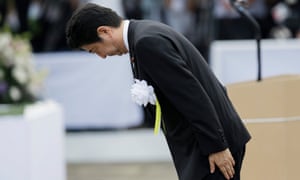Japan’s prime minister, Shinzo Abe, will include the words “apology” and “aggression” in his much-anticipated war anniversary statement later this week according to reports.
But it has been suggested he could still anger China and South Korea by shifting the focus away from his country’s wartime conduct.
His statement, expected on Friday, the day before the anniversary marking Japan’s defeat in the second world war, will be watched closely in Beijing and Seoul for signs that Abe is attempting to sanitise Japan’s war record.
Previous reports suggested his remarks would ditch key phrases in a landmark statement made by then Japanese leader Tomiichi Murayama in 1995.
Murayama expressed a “heartfelt apology” for Japan’s conduct on the Asian mainland in the first half of the last century, which included invasions of parts of eastern China and colonial rule over the Korean peninsula.
Japan, “through its colonial rule and aggression, caused tremendous damage and suffering to the people of many countries, particularly to those of Asian nations,” Murayama said. Junichiro Koizumi repeated the statement 10 years later.
Public broadcaster NHK said Abe’s draft statement included the words “apology” and “aggression,” in an apparent attempt to deflect criticism from South Korea and China.
The inclusion of the words would also satisfy demands from the US, which has called on Japan and its neighbours to overcome bitter rows over their war legacy.
NHK said the draft would also make specific reference to other key words in the Murayama statement, including “deep remorse” and “colonial rule”.
The broadcaster did not, however, say in which context they would appear.
The Sankei Shimbun, a rightwing daily, said Abe was unlikely to use the word “aggression” in singling out Japan’s wartime conduct. “It is likely that he will touch on (aggression) as a universally unforgivable act,” the paper said.
Koichi Nakano, a politics professor at Sophia University in Tokyo, said the statement could diverge significantly from the spirit of the Murayama apology, depending on the context.
“While it appears that Abe is considering the inclusion of such key words in an attempt to pre-empt criticism both at home and from overseas, it seems possible, perhaps even probable, that he will significantly alter the context in which these words are used from the Murayama statement,” Nakano said.
“He might try to satisfy both his revisionist base and critics, but he might also simply anger both.”
Abe, who has seen his approval ratings fall in recent weeks over attempts to broaden Japan’s military role, has indicated he will express remorse over Japan’s wartime actions.
But he has also voiced determination to issue a “forward-looking” message that highlights Japan’s peaceful contribution to the international community in the 70 years since the end of the war.
Last week, a government panel set up to advise on the wording of the statement condemned Japan’s colonial rule over the Korean peninsula from 1910 to 1945 and parts of China from 1931.
“The responsibilities of the Japanese government and military leaders from the 1930s and beyond are very serious indeed,” the panel said.
It said Japan had “caused much harm to various countries, largely in Asia, through a reckless war,” but stopped short of recommending a fresh apology.
China and South Korea have warned that they expect Abe to honour the 1995 apology, as the region prepares to mark the end of the Pacific War on 15 August.
In Beijing, a foreign ministry statement said China expects Japan “to issue a clear and correct message about the nature of the war and its responsibility for it.”
“The statement added: “Only by doing this can Japan realise genuine reconciliation with its neighbouring countries in Asia.”
Abe indicated he would not mark Saturday’s anniversary with a pilgrimage to Yasukuni, a shrine in Tokyo that honours Japan’s war dead, including class-A war criminals, but would send a ritual offering instead.
www.theguardian.com/world/2015/aug/10/japans-abe-to-include-word-apology-in-second-world-war-anniversary-speech




